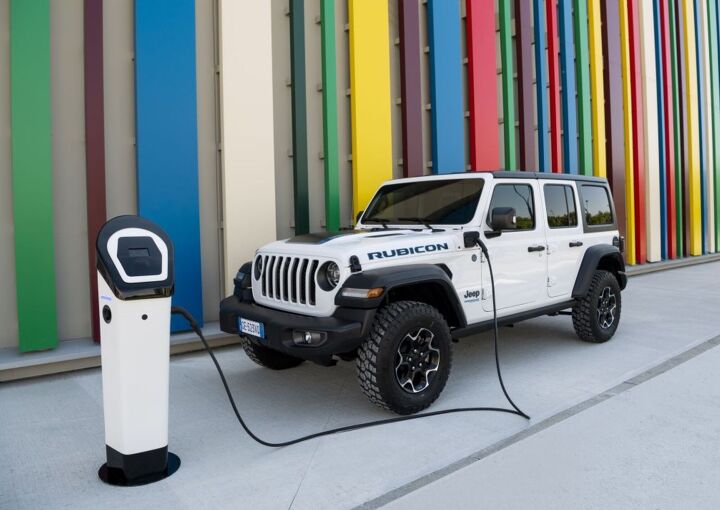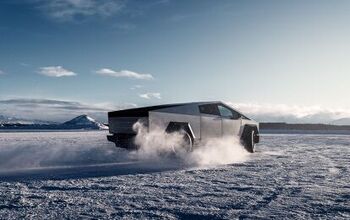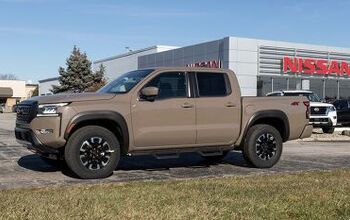Jeep Recalls 45,000 Electrified Wranglers Over Fire Risk

Following eight reports of vehicle fires, Jeep has decided to recall 32,125 examples of the Wrangler 4xe PHEV in the United States. The vehicles come from the 2021-2024 model year, with roughly 13,000 being situated outside the U.S. While parent company Stellantis has said the vehicles can continue being driven, it's advising customers against charging them and has likewise recommended parking them outdoors away from anything you might not want burned.
Out of the eight fires reported by Jeep, six reportedly had a Wrangler 4xe hybrid plugged into a charging port. Fortunately, the company said it's unaware of any injuries relating to the issue.
But that does make it sound as though the problem stems from the vehicle's relatively small 17.3-kWh battery pack and/or the charging system. Battery defects have been a sore spot for electrification as the technology matures. While often less rampant than the media likes to suggest, EV fires tend to be extreme in nature due to the way lithium-ion batteries combust.
Damage to the individual cells or internal short circuiting can create thermal runaway events that quickly encompasses the entire battery pack. In fact, most EV fires seem to happen immediately following a crash or when vehicles are plugged in and taking on power. Due to the high energy density of these batteries, the rustling fires are often incredibly violent and exceptionally difficult to stop. As a result, emergency crews often take special precautions when dealing with EV fires — focusing on containment as they allow the battery to burn itself out.
While Stellantis doesn’t appear to have any concrete answers on what’s happening with the Jeep Wrangler 4xe, the company does have a recall plan in place. Sadly, it’s the obligatory software update that seems to have become a catch-all remedy for modern vehicles suffering catastrophic failures. We’re not saying that’s not the best solution here, especially if the fault pertains to the Wrangler’s charging regimen. Modern vehicles are heavily reliant on computers and a few bad lines of code is certainly capable of causing problems.
However, the automotive industry has been leaning on “software updates” to address all sorts of issues lately. Software tweaks cannot solve mechanical problems and sometimes appear to be little more than a way for the company to buy itself some time in the early stages of a recall. They cannot solve any physical defects pertaining to the Jeep’s batteries or charging hardware. But they are significantly cheaper than having to pay for replacement parts and the necessary labor involved in most recall campaigns.
Though Jeep has said it would replace battery packs on Wrangler models where a specific error code is observed. This offers us a hint of where the problem area happens to be and also offers some peace of mind that Stellantis isn’t simply going to do a software flash before calling it a day.
If the software fix doesn’t work, we will undoubtedly see Jeep making more headlines as the Department of Transportation demands additional actions be taken. Concerned Jeep owners can head to the NHTSA recall website and input their Vehicle Identification Number (VIN) or contact the manufacturer at 1-800-853-1403.
[Image: Jeep]
Become a TTAC insider. Get the latest news, features, TTAC takes, and everything else that gets to the truth about cars first by subscribing to our newsletter.

A staunch consumer advocate tracking industry trends and regulation. Before joining TTAC, Matt spent a decade working for marketing and research firms based in NYC. Clients included several of the world’s largest automakers, global tire brands, and aftermarket part suppliers. Dissatisfied with the corporate world and resentful of having to wear suits everyday, he pivoted to writing about cars. Since then, that man has become an ardent supporter of the right-to-repair movement, been interviewed on the auto industry by national radio broadcasts, driven more rental cars than anyone ever should, participated in amateur rallying events, and received the requisite minimum training as sanctioned by the SCCA. Handy with a wrench, Matt grew up surrounded by Detroit auto workers and managed to get a pizza delivery job before he was legally eligible. He later found himself driving box trucks through Manhattan, guaranteeing future sympathy for actual truckers. He continues to conduct research pertaining to the automotive sector as an independent contractor and has since moved back to his native Michigan, closer to where the cars are born. A contrarian, Matt claims to prefer understeer — stating that front and all-wheel drive vehicles cater best to his driving style.
More by Matt Posky
Latest Car Reviews
Read moreLatest Product Reviews
Read moreRecent Comments
- El scotto No rag-top, no rag-top(s) = not a prestigious car brand. Think it through. All of the high-end Germans and Lexus have rag-tops. Corvette is really its own brand.World-leading engines. AMG, M, S and well Lexus is third-world tough. GM makes one of the best V-8s in the world in Bowling Green. But nooooo, noooo, we're GM only Corvettes get Corvette engines. Balderdash! I say. Put Corvette engines in the top-tier Cadillacs. I know GM could make a world-class 3.5 liter V-6 but they don't or won't. In the interior everything that gets touched, including your butt, has to feel good. No exceptions.Some think that those who pay above MSRP and brag about it are idiots. Go the opposite direction, and offer an extended 10-year 100,000-mile factory warranty. At a reasonable price. That's Acura's current business model.
- Carrera 2014 Toyota Corolla with 192,000 miles bought new. Oil changes every 5,000 miles, 1 coolant flush, and a bunch of air filters and in cabin air filters, and wipers. On my 4th set of tires.Original brake pads ( manual transmission), original spark plugs. Nothing else...it's a Toyota. Did most of oil changes either free at Toyota or myself. Also 3 batteries.2022 Acura TLX A-Spec AWD 13,000 miles now but bought new.Two oil changes...2006 Hyundai Elantra gifted from a colleague with 318,000 when I got it, and 335,000 now. It needed some TLC. A set of cheap Chinese tires ($275), AC compressor, evaporator, expansion valve package ( $290) , two TYC headlights $120, one battery ( $95), two oil changes, air filters, Denso alternator ( $185), coolant, and labor for AC job ( $200).
- Mike-NB2 This is a mostly uninformed vote, but I'll go with the Mazda 3 too.I haven't driven a new Civic, so I can't say anything about it, but two weeks ago I had a 2023 Corolla as a rental. While I can understand why so many people buy these, I was surprised at how bad the CVT is. Many rentals I've driven have a CVT and while I know it has one and can tell, they aren't usually too bad. I'd never own a car with a CVT, but I can live with one as a rental. But the Corolla's CVT was terrible. It was like it screamed "CVT!" the whole time. On the highway with cruise control on, I could feel it adjusting to track the set speed. Passing on the highway (two-lane) was risky. The engine isn't under-powered, but the CVT makes it seem that way.A minor complaint is about the steering. It's waaaay over-assisted. At low speeds, it's like a 70s LTD with one-finger effort. Maybe that's deliberate though, given the Corolla's demographic.
- Mike-NB2 2019 Ranger - 30,000 miles / 50,000 km. Nothing but oil changes. Original tires are being replaced a week from Wednesday. (Not all that mileage is on the original A/S tires. I put dedicated winter rims/tires on it every winter.)2024 - Golf R - 1700 miles / 2800 km. Not really broken in yet. Nothing but gas in the tank.
- SaulTigh I've got a 2014 F150 with 87K on the clock and have spent exactly $4,180.77 in maintenance and repairs in that time. That's pretty hard to beat.Hard to say on my 2019 Mercedes, because I prepaid for three years of service (B,A,B) and am getting the last of those at the end of the month. Did just drop $1,700 on new Michelins for it at Tire Rack. Tires for the F150 late last year were under $700, so I'd say the Benz is roughly 2 to 3 times as pricy for anything over the Ford.I have the F150 serviced at a large independent shop, the Benz at the dealership.


































Comments
Join the conversation
Let’s face it , the kind of people driving these things are AFI: Asking For It.
I own a 2023 Sahara 4XE and my vin does not show a recall. "Never buying a crap domestic OEM trash box ever again." I love my Jeep, and I just drove a 3,000 mile two week road trip and it worked flawlessly.